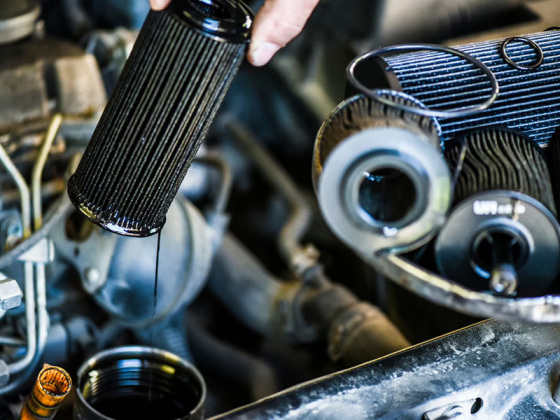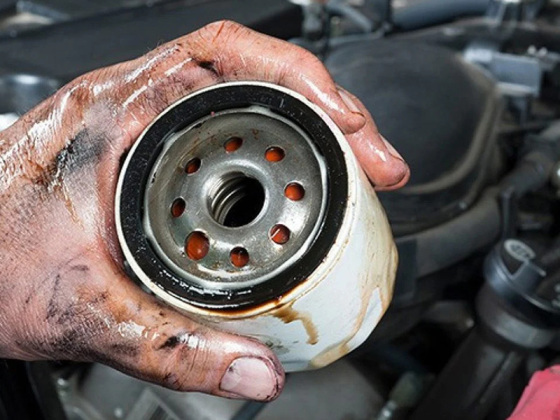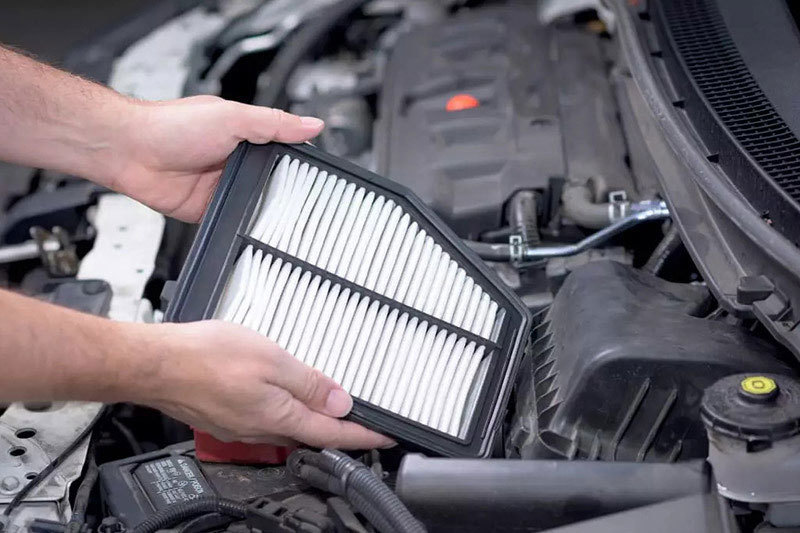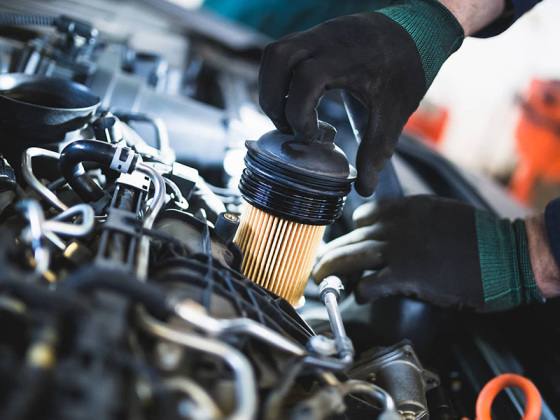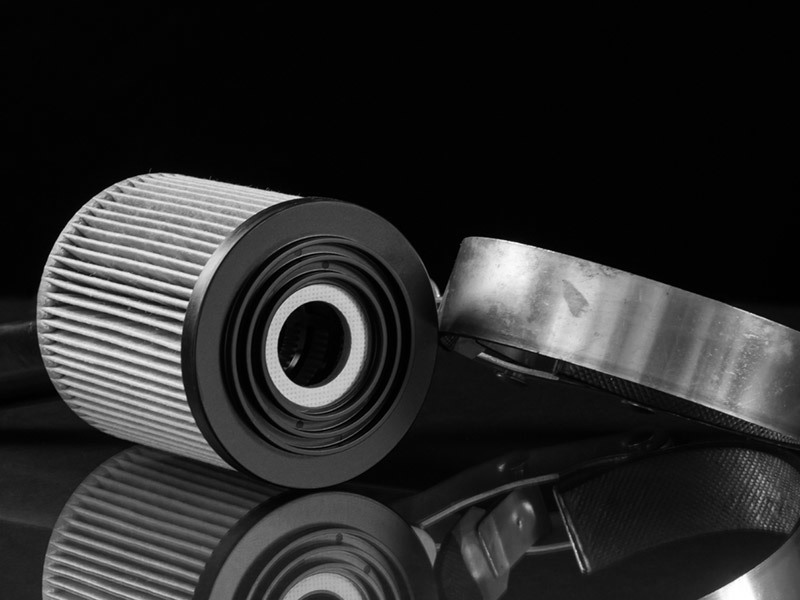10 signs that your oil filter needs to be replaced immediately-keep your engine running smoothly and prevent costly damage
Release time:
25 Jun,2024
Maintaining a well-functioning oil filter is essential to maintaining the performance, longevity and overall health of the engine. By replacing faulty or clogged oil filters in a timely manner, you can avoid costly repairs, breakdowns and potential engine damage. Be alert to the ten signs mentioned in this article and make regular oil filter maintenance part of your vehicle's daily care.

On the importance of a well-functioning oil filter
Your vehicle's oil filter plays a vital role in maintaining the overall health and performance of your engine. By filtering impurities and pollutants in engine oil, clean oil is ensured to circulate in the engine, lubricating important parts and reducing friction. Over time, the oil filter may become clogged, resulting in reduced filtration efficiency and potential damage to the engine. In this article, we will explore the signs that indicate that your oil filter needs to be replaced immediately to prevent expensive repairs and keep the engine running smoothly.
10 signs that your oil filter needs to be replaced immediately
2.1. Low oil pressure warning lamp
The low oil pressure warning light clearly indicates that your oil filter may need to be replaced. When the oil filter is clogged, it will restrict the oil flow, causing the oil pressure to drop. This warning light usually appears on the dashboard and should not be ignored. If you find this warning light on, you must check the oil filter and replace it immediately.
2.2. Dirty or black engine oil
Check the color and consistency of the engine oil, because it can reveal the condition of the oil filter. Clean engine oil is usually amber or light brown. However, a clogged or failed oil filter may cause the oil to become dirty or black. This color change indicates the presence of contaminants that the oil filter should remove. If you find this discoloration, it means that your oil filter cannot effectively filter the oil and needs to be replaced.
2.3. Metal noise or engine noise
Unusual engine noises, such as metallic sounds or loud knocking sounds, may indicate a malfunction of the oil filter. When the oil filter is clogged, it restricts the flow of oil to critical engine components, resulting in increased friction. This friction can cause abnormal engine noise. If you hear any unfamiliar sounds from the engine, it is important to replace the oil filter in time to solve the problem.
2.4. Poor fuel efficiency
Deterioration of the oil filter can lead to reduced fuel efficiency. When the filter is clogged, the engine must work harder to push the oil through, resulting in increased fuel consumption. If you find that your vehicle's gasoline mileage has suddenly decreased, this may indicate that your oil filter is causing inefficient fuel combustion. Changing the oil filter helps to restore optimal fuel efficiency.
2.5. Engine misfire or flameout
Engine misfire or flameout may be a symptom of oil filter failure. A clogged oil filter will disrupt the oil flow, causing engine parts to be unable to lubricate properly. Lack of lubrication can cause the engine to misfire or even stall completely. If you encounter these problems, you must check the oil filter and replace it if necessary.
2.6. Engine overheating
Failure of the oil filter can cause the engine to overheat. When the filter is clogged, the oil flow is restricted, resulting in insufficient lubrication and increased friction. The excess heat generated by this friction can cause the engine to overheat. If you find that the engine thermometer rises or the warning light is on, you must solve the problem immediately by replacing the oil filter.
2.7. Oil Spill
Oil leakage around the oil filter area may indicate a filter failure and requires immediate treatment. A clogged or damaged oil filter may cause oil leakage, which may impair the performance and health of the engine. Check the area around the oil filter for signs of oil leakage. If you find any leaks, be sure to replace the oil filter immediately to prevent further damage.
2.8. Engine performance problems
Decreased engine performance, such as reduced power or slow acceleration, may be related to oil filter failure. A clogged filter can restrict oil flow, negatively affecting engine performance. If you find that the engine power drops or lacks responsiveness, it may be time to replace the oil filter to restore optimal performance.
2.9. Smoke exhaust
Excessive exhaust gas may indicate a malfunction of the oil filter and requires immediate attention. When the oil filter is clogged, the engine may burn oil, causing black smoke from the exhaust. If you find abnormally thick or colored smoke in the exhaust, you must immediately solve the problem by replacing the oil filter.
2.10. Manufacturer's Warnings
Manufacturers usually provide recommend maintenance plans and guidelines, including oil filter change intervals. Consult the vehicle's owner's manual or contact the manufacturer for specific recommendations regarding oil filter replacement. Following these guidelines can help prevent potential engine damage and maintain warranty coverage.
3. Frequently Asked Questions (FAQ)
3.1. How often should I change the oil filter?
The frequency of oil filter replacement may vary depending on the make, model and use of the vehicle. As a general guideline, it is recommended to replace the oil filter every 3,000 to 7,500 miles or every six months, whichever comes first. However, refer to the vehicle's owner's manual for the manufacturer's specific recommendations.
3.2. Can I change the oil filter myself?
For those who have basic car knowledge and have the necessary tools, replacing the oil filter can be a relatively simple task. However, if you feel unsure or uncomfortable about replacing yourself, it is recommended that you seek professional help from a qualified mechanic or service center.
3.3. What happens if the faulty oil filter is not replaced?
Neglecting to replace a faulty oil filter may cause serious engine damage. A clogged or damaged oil filter may allow contaminants to circulate through the engine, resulting in increased friction, reduced lubrication, and potential component failure. Over time, this can lead to expensive repairs or even complete engine failure.
3.4. Will a clogged oil filter damage my engine?
Yes, a clogged oil filter can cause serious damage to your engine over time. When the filter becomes clogged, it can impede oil flow and impair lubrication of critical engine components. Lack of proper lubrication can lead to increased friction, overheating and accelerated wear. Regular replacement of the oil filter is essential to prevent engine damage.
3.5. Are there different types of oil filters to choose from?
Yes, there are many types of oil filters to choose from, including standard filters, high-efficiency filters and synthetic media filters. Each type offers different filtration capabilities and is designed for specific engine requirements. Please consult the vehicle's user manual or seek guidance from a trusted mechanic to determine the best oil filter for your vehicle.
4. Conclusion: For the health of the engine, priority should be given to replacing the oil filter
Maintaining a well-functioning oil filter is essential to maintaining the performance, longevity and overall health of the engine. By replacing faulty or clogged oil filters in a timely manner, you can avoid costly repairs, breakdowns and potential engine damage. Be alert to the ten signs mentioned in this article and make regular oil filter maintenance part of your vehicle's daily care. By doing so, you can enjoy a smooth driving experience, the best fuel efficiency, and know that your engine is well protected, giving you peace of mind.
Key words:
- All
- Product Management
- News
- Introduction
- Enterprise outlets
- FAQ
- Enterprise Video
- Enterprise Atlas
More information



